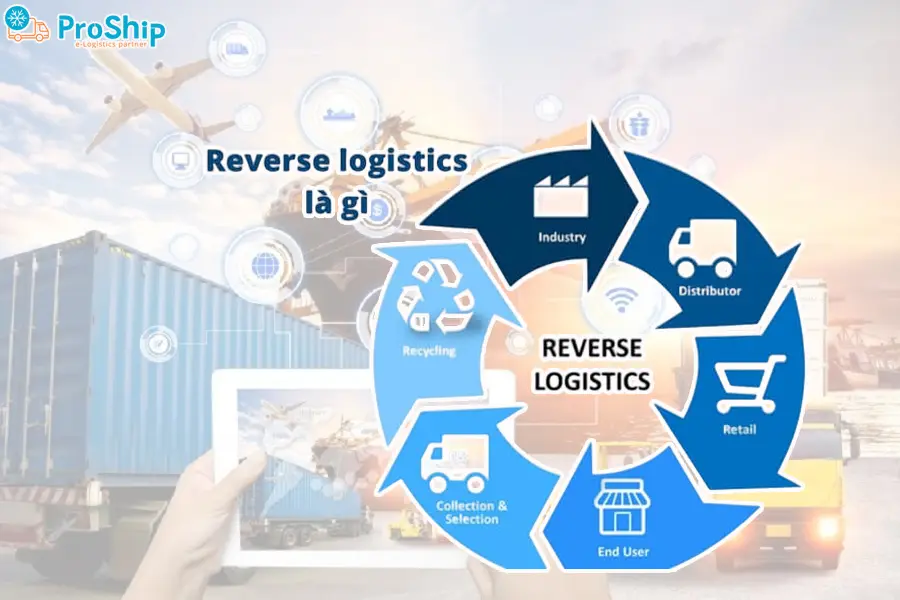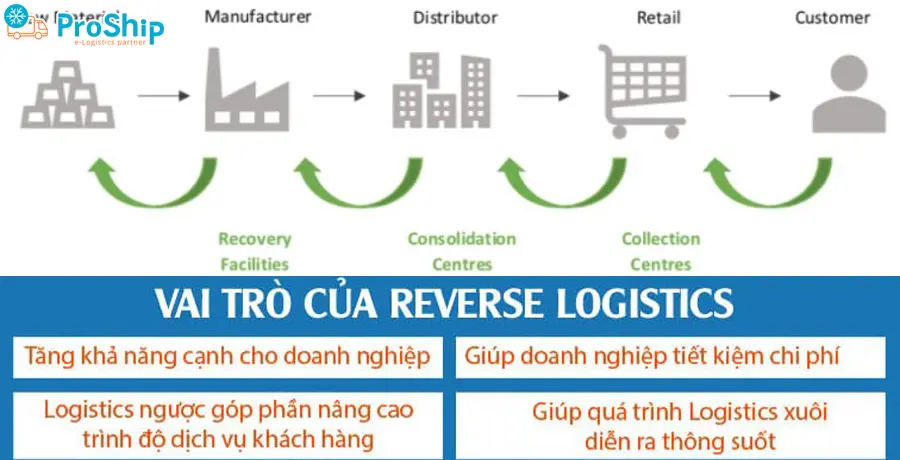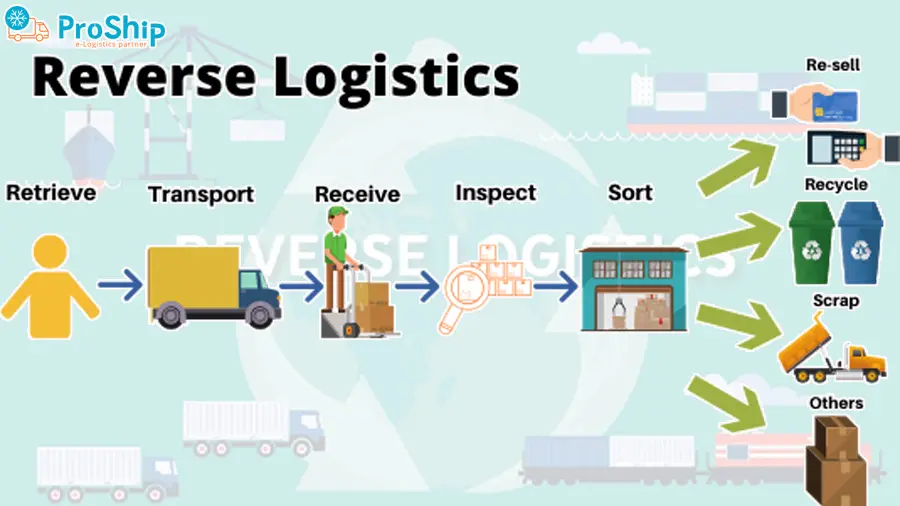Doanh nghiệp bạn muốn tiết kiệm chi phí vận hành, muốn tăng khả năng cạnh tranh cho doanh nghiệp, muốn quá trình logistics xuôi diễn ra suôn sẻ,…nên cần áp dụng hiệu quả Dịch vụ Reverse Logistics trong chuỗi cung ứng? Bạn đang ứng dụng mô hình Reverse Logistics nhưng gặp vướng mắc, khó khăn ở một vài khâu nên cần nắm quy trình chuẩn của loại hình dịch vụ thông dụng này? Bạn chưa phân biệt được giữa Logistics ngược với Logistics xuôi có gì giống và khác nhau để có thể vận dụng kết hợp đồng thời một cách hiệu quả cả hai mô hình này? PROSHIP.VN chúng tôi sẽ thông qua bài viết này để giúp doanh nghiệp hiểu rõ Reverse Logistics là gì, reverse logistics đóng vai trò quan trọng ra sao, tại sao cần phải có reverse logistics, quy trình reverse logistics được tiến hành qua các bước nào,…từ đó sẽ có những kế hoạch đúng đắn, hợp lý trong sản xuất – kinh doanh – cung ứng hàng hóa tới tay khách hàng cuối.
>>Xem thêm:
Reverse Logistics là gì và có tầm quan trọng ra sao với doanh nghiệp?
Reverse logistics là gì?
Reverse logistics là gì? Logistics ngược là gì? Reverse Logistics hay Logistics ngược (Hậu cần ngược) là quá trình lên kế hoạch, thực hiện và kiểm soát việc đưa nguyên liệu, bán thành phẩm, thành phẩm hay thông tin từ nơi tiêu thu về nơi sản xuất với mục tiêu thu hồi, xử lý lại.

* Ví dụ: Reverse Logistics dễ thấy như các hãng xe lớn thu hồi hàng loạt các xe mà họ đã đưa ra thị trường do các sự cố kỹ thuật, hay các hãng điện tử thu hồi các sản phẩm điện thoại do lỗi phần mềm, lỗi pin,…Tất cả sẽ được thu hồi lại về nhà sản xuất để xử lý, khắc phục những sự cố và gửi lại cho người tiêu dùng phiên bản hoàn thiện nhất.
Tầm quan trọng của Logistics ngược với doanh nghiệp
Logistics ngược là công việc không thể thiếu trong chuỗi cung ứng sản xuất của doanh nghiệp, nhà phân phối, bán buôn bán lẻ. Sở dĩ, Logistics ngược trở thành dịch vụ quan trọng trong hoạt động Logistics vì hoạt động này giúp:
- Giảm tài sản cố định tức là khấu hao tài sản sẽ tăng lên;
- Giảm giá trị tài sản lưu động là các khoản phải thu giảm, giá trị tồn kho của hàng hóa sẽ thấp hơn hàng hóa được thu hồi về;
- Giảm doanh thu bán hàng và tăng chi phí bán hàng;
- Tăng các khoản phải trả trong ngắn hạn (là các khoản liên quan đến việc sửa chữa và gia cố lại).
Reverse Logistics đóng vai trò quan trọng ra sao?
Reverse logistics là gì hay logistics ngược là gì đã được Proship giải đáp ở trên. Tiếp theo, bạn cần hiểu rằng, đối với chuỗi cung ứng hàng hóa thì Reverse Logistics đóng vai trò rất quan trọng. Cụ thể:
Giúp doanh nghiệp tiết kiệm chi phí
Mặc dù Logistics ngược khiến các chi phí vận chuyển, dự trữ, sửa chữa,…của doanh nghiệp tăng lên. Song, nếu thực hiện tốt hoạt động Reverse Logistics sẽ giúp doanh nghiệp tiết kiệm được các khoản phí khác như phí bao bì, phí nguyên vật liệu, bán lại sản phẩm để tăng doanh thu,…
Giúp bảo vệ môi trường tốt hơn
Việc thu hồi các sản phẩm bị lỗi, hỏng có thể tái chế sử dụng hoặc tiêu hủy đúng cách sẽ giúp hạn chế ảnh hưởng xấu đến môi trường.
Giúp quá trình Logistics xuôi diễn ra thông suốt
Cụ thể, tại một số khâu của quá trình Logistics xuôi có thể xuất hiện các sản phẩm không đạt yêu cầu. Do đó, để đảm bảo hoạt động Logistics xuôi diễn ra thông suốt thì Logistics ngược sẽ đảm nhận trách nhiệm đưa sản phẩm quay lại thị trường kịp thời.

Tăng khả năng cạnh cho doanh nghiệp
Với những doanh nghiệp có hoạt động thu hồi sản phẩm lỗi, hỏng tốt sẽ góp phần giúp họ tăng khả năng cạnh tranh trên thị trường. Bởi, họ đáp ứng và thỏa mãn tốt nhu cầu cho khách hàng, thậm chí dù sản phẩm lỗi khách hàng vẫn có thể chấp nhận.
Góp phần nâng cao trình độ Dịch vụ khách hàng
Một chính sách thu hồi tốt góp phần mang lại lợi thế cạnh tranh cho chính Doanh nghiệp bởi khách hàng được thỏa mãn tốt nhu cầu (kể cả khi họ nhận được sản phẩm lỗi).
So sánh sự khác nhau giữa Logistics ngược và Logistics xuôi
Proship Logistics sẽ tiếp tục chia sẻ cho bạn sự khác biệt giữa Logistics ngược và Logistics xuôi thế nào ở bảng sau:
| Tiêu chí | Logistics ngược | Logistics xuôi |
| Tiềm năng Logistics | Khó có thể dự báo trước. | Dự báo đơn giản, dễ dàng. |
| Quy trình vận chuyển | Vận chuyển từ nhiều điểm đến một điểm. | Vận chuyển từ một điểm đến nhiều điểm. |
| Chất lượng sản phẩm | Không đồng đều về chất lượng. | Sản phẩm tốt, chất lượng như nhau. |
| Bao bì đóng gói | Không còn nguyên vẹn, có tình trạng bị rách, bị phá hủy. | Sản phẩm còn nguyên vẹn, đóng gói đúng theo tiêu chuẩn. |
| Giá thành | Phụ thuộc vào nhiều yếu tố có sự chênh lệch ở từng thời điểm khác nhau. | Có sự nhất quán, thống nhất giá thành cung cấp. |
| Tốc độ | Không là thứ tự ưu tiên hàng đầu. | Được coi là quan trọng. |
| Chi phí phát sinh | Không thể kiểm soát được. | Được kiểm soát chặt chẽ. |
| Phương thức quản lý dự trữ | Không có tính nhất quán trong quản lý dự trữ. | Quản lý dự trữ nhất quán. |
| Trách nhiệm | Có sự mâu thuẫn giữa sở hữu và trách nhiệm. | Quyền sở hữu và trách nhiệm vật chất rõ ràng. |
Các bước quy trình Logistics ngược diễn ra thế nào?
Quy trình Logistics ngược (Reverse Logistics) gồm 4 bước cơ bản:
Giai đoạn 1: Tập hợp
hu thập các sản phẩm không bán được, sản phẩm lỗi hoặc sản phẩm cần tái chế từ điểm tiêu dùng.
Giai đoạn 2: Kiểm tra
Tiến hành kiểm tra chất lượng, phân loại sản phẩm sau khi thu hồi.

Giai đoạn 3: Xử lý
Thực hiện các hoạt động xử lý sản phẩm đã thu hồi, bao gồm sửa chữa, tái sử dụng, tái chế hoặc tiêu hủy một cách hợp lý.
Giai đoạn 4: Phân phối lại
Đưa sản phẩm đã qua xử lý trở lại chuỗi cung ứng hoặc thị trường theo các phương thức phân phối mới.
Như vậy, bạn đã hiểu được Reverse Logistics là gì, quy trình reverse logistics gồm mấy bước, logistics ngược đóng vai trò ra sao,…để duy trì hiệu quả mọi hoạt động, quy trình kiểm soát hàng hóa, nguyên vật liệu,…Liên hệ ngay 0909 344 247 để được tư vấn và báo giá trực tiếp các dịch vụ liên quan tới Logistics, vận chuyển và xuất nhập khẩu hàng hóa giá rẻ tại Proship.
